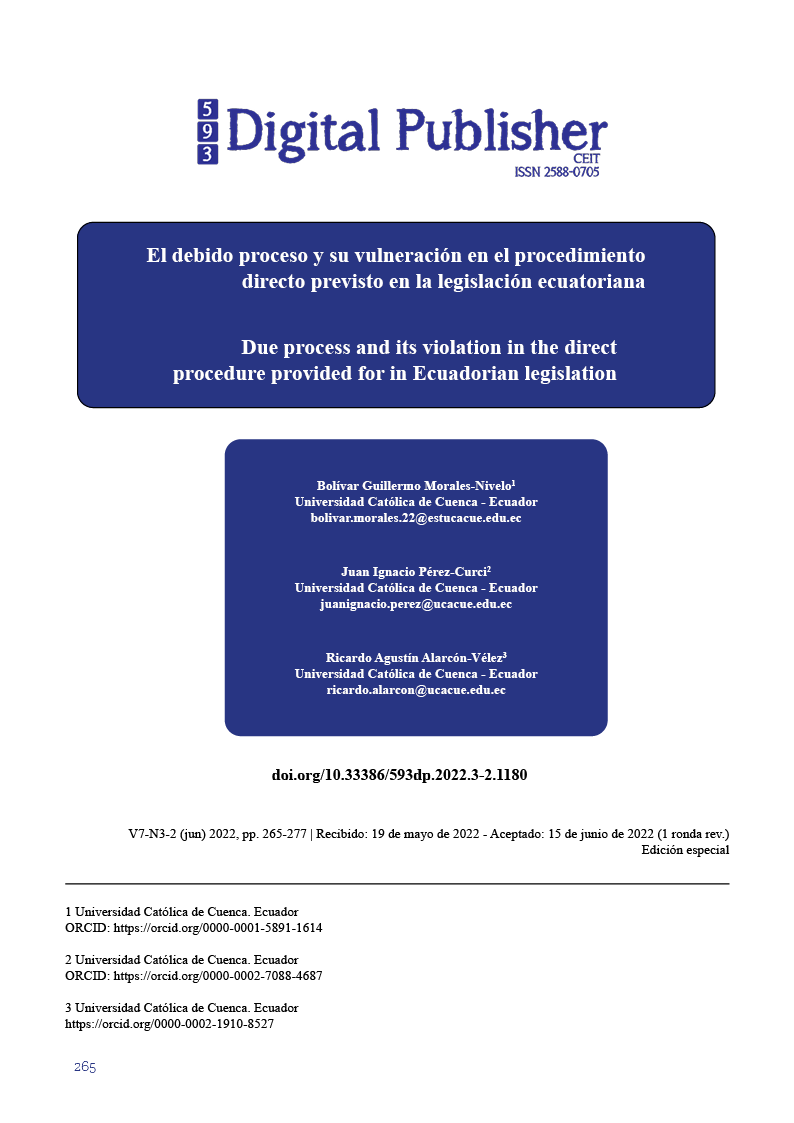Due process and its violation in the direct procedure provided for in Ecuadorian legislation
Main Article Content
Abstract
In this article we are going to analyze the violations that exist to the due process, when applying the direct procedure determined in the Organic Comprehensive Criminal Code in article 640, reflecting for this on the guarantees provided in the Constitution, the Law, the International Treaties and Conventions. , and the objective proposed in the present study is to determine the violation of due process when applying the direct procedure in our Ecuadorian legislation, consequently referring to the time that the accused is granted to be able to exercise his defense in a correct way and count with the impartiality of the administrators of justice. Well, the methodology applied was of a bibliographic-documentary type, with a descriptive scope, since the criteria of several authors of books, scientific, national and international journals were used, specifically on the violation of the guarantees of due process at the time of applying the direct procedure. The inductive-deductive method was also used, just as the historical method was applied in the revision of regulations, doctrine and jurisprudence to develop scientific research.
Downloads
Article Details

This work is licensed under a Creative Commons Attribution-NonCommercial-ShareAlike 4.0 International License.
1. Derechos de autor
Las obras que se publican en 593 Digital Publisher CEIT están sujetas a los siguientes términos:
1.1. 593 Digital Publisher CEIT, conserva los derechos patrimoniales (copyright) de las obras publicadas, favorece y permite la reutilización de las mismas bajo la licencia Licencia Creative Commons 4.0 de Reconocimiento-NoComercial-CompartirIgual 4.0, por lo cual se pueden copiar, usar, difundir, transmitir y exponer públicamente, siempre que:
1.1.a. Se cite la autoría y fuente original de su publicación (revista, editorial, URL).
1.1.b. No se usen para fines comerciales u onerosos.
1.1.c. Se mencione la existencia y especificaciones de esta licencia de uso.
References
Agudelo-Ramírez, M. (2004). Opinión Jurídica. Revista de Ciencias, 4(7), 89-105.
Asamblea Constituyente. (2008). Constitución de la República del Ecuador. Publicado en el Registro Oficial No. 449, de fecha 20 de octubre del 2008.
Asamblea Nacional de Ecuador. (2019). Ley Orgánica Reformatoria al Código Orgánico Integral Penal. Quito: Registro Oficial 107, de fecha de fecha 24 de diciembre del 2019.
Asamblea Nacional. (2014). Código Orgánico Integral Penal. Publicado en el Segundo Suplemento del Registro Oficial No. 180, de fecha 10 de febrero del 2014.
Baratta, A. (2004). Principios del derecho penal mínimo (para una teoría de los derechos humanos como objeto y límite de la ley penal). En C. A. Elbert, Criminología y sistema penal. Compilación in memorian (págs. 299-334). Montevideo, Buenos Aires: Euros Editores S.R.L.
Cabanellas, G. (2008). Diccionario de Derecho Usual. Buenos Aires: Editorial Heliasta.
CIDH. Caso Castillo Petruzzi y otros. Publicado en Sentencia de fecha 30 de mayo de 1999. Recuperado de http://www.corteidh.or.cr/.
Cruz, O. (2015). Defensa a la Defensa y Abogacía en México.
DDHH,1948.https://www.un.org/es/documents/udhr/UDHR_booklet_SP_web.pdf.
Galiano, G., & Tamayo, G. (2018). Análisis constitucional de los derechos personalísimos y su relación con los derechos del Buen Vivir en la Constitución de Ecuador. Revista Derecho Privado No. 34, 123-156.
García Ramírez, S. (2012). El debido proceso: criterios de la jurisprudencia interamericana. México: Porrúa.
INEJ. (2018). El Debido Proceso como Derecho Humano. Nicaragua: Instituto de Estudio e Investigación Jurídica.
Jaramillo, S. (11 de 07 de 2017). Constitucionalización del Derecho Penal. https://www.derechoecuador.com/constitucionalizacion-del-derecho-pena.
Kronawetter Zarza, A. E. (2003). Derecho a las garantías judiciales y al debido proceso. En Derechos humanos en Paraguay 2003. Asunción: Codehupy, Coordinadora de Derechos Humanos del Paraguay.
Landa, C. (2002). El derecho fundamental al debido proceso y a la tutela jurisdiccional. Pensamiento Constitucional (8), 445-461.
Larenz, K. (1995). Derecho Justo, fundamentos de ética jurídica. Madrid: Civitas.
Maier, J. (2007). Derecho Procesal Penal, parte general tomo II. Buenos Aires: Del Puerto.
Montaño, C. (2020) Garantías Del Debido Proceso y La Legitima Defensa.
OEA. (1966). Convención Americana sobre Derechos Humanos. San José, Costa Rica: Organización de Estados Americanos.
Ovalle-Favella, J. (2011). Derechos Humanos y Garantías Constitucionales. Revista Jurídica UNAN, 23-38.
Prieto, L. (2012). Garantismo y Derecho Penal. Barcelona: Iuste.
Rescia, V. (2018). El Debido Proceso Legal y la Convención Americana sobre Derechos Humanos. Recuperado el 2020 de 02 de 19, de Corte Interamericana de Derechos Humanos: http://www.corteidh.or.cr/tablas/a17762.pdf
Rodríguez Rescia, V. M. (2012). El debido proceso legal y la Convención Americana de los derechos humanos.
Roxin, C., & Schünemann, B. (2019). Derecho Procesal Penal. Buenos Aires, Argentina: Ediciones Didot.
Santiago, A. R. (2017). Vulneración a la Defensa en el Procedimiento Directo. Guayaquil.
Santiago, R, A. (2017). Las Garantías al Debido Proceso en el Procedimiento Directo Regulado en el Coip. Guayaquil




